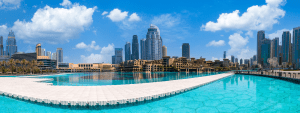“Serviced Apartments” Regulations in Dubai: Are they a type of “Hotel Apartment” and already regulated, or do they require new legal frameworks?
Serviced Apartments Regulation Dubai
Some time ago, I’d read a short article about serviced apartments in Dubai written by a real estate expert who is known for his proficiency and broad experience. His opinion caught my notice, stating that according to the article, serviced apartments are not a type of hotel apartment.
The article was brief, and did not cover all the legal issues witnessed by the courts over the dozens of lawsuits that resulted in a great deal of controversy between real estate developers and investors in the hotel sector.
I have contributed as a lawyer and legal advisor in most of these cases through our law firm, and the Court of Cassation has established many important legal principles that confirm the incorrectness of the outcome of the expert’s article, which we will discuss next in some detail, the historical background, the causes of the conflict, and its implications.
i. What are ‘Serviced Apartments’?
Serviced apartments in Dubai are self-contained residential units that come with a range of services and amenities, including housekeeping, 24/7 security, changing of covers, swimming pools, fitness facilities, and many other hotel services and amenities such as cooks, refrigerators, furniture, washing machines, etc. These properties have become increasingly popular in Dubai due to the city’s booming tourism industry and the growing number of expatriates working in the UAE.
ii. Historical Background
On 04/01/1997, the late H.H. Sheikh Maktoum bin Rashid Al Maktoum, the former ruler of Dubai, issued law No. (1) of 1997 founding the Department of Tourism and Commerce Marketing (DTCM). One of the department’s competencies, according to the decree, is the licensing, classification, and supervision of hotels and furnished apartments.
On 15/08/1998, H.H. Sheikh Mohammed bin Rashid Al Maktoum, Dubai’s Crown Prince at the time, issued regulation No. (1) for the year 1998 regarding licensing and classification of hotels, hostels, and furnished apartments. Article (2) defined “hotel establishment” as “hotels, hostels, and furnished apartments” and “furnished apartments” as “A group of no less than eight furnished villas or apartments that are rented to guests on a daily, weekly, monthly, or yearly basis.”
Said regulation mentioned neither “Serviced Apartments” nor “Hotel Apartments”. Building a new hotel establishment and changing a current building to a hotel establishment to be rented on a daily/weekly/monthly/yearly basis became subject to obtaining the approvals referred to in this regulation.
In 2013, H.H. Sheikh Mohammed bin Rashid Al Maktoum, the Ruler of Dubai, issued two decrees that included a fundamental upgrade in the legal form and frameworks in the tourism and hotel sector in the Emirate of Dubai, whereby Regulation No. (1) of 1998 was repealed and replaced by two main legislations alongside a collection of related decrees, decisions, and regulations.
The year 2013 witnessed an increasing demand in Dubai for hotel real estate markets of all kinds, particularly hotel apartments, which are distinguished from hotel rooms in that they allow residents additional options; for example, they benefit from the facilities inside the apartments themselves, such as a large refrigerator, washing machine, and stove. Thus, the residents satisfy certain interests with minimal effort and without paying for it.
As a result, many major real estate developers have been active in marketing and advertising, urging investors to buy units in entire buildings designated as hotel apartments. Many luxury and deluxe projects were announced, and their units sold upon the off-plan system.
According to the two decrees in effect so far, tourist facilities designated for hosting purposes can be divided into two main types:
- Hotel Establishments: These include hotels, resorts, hotel apartments, guest houses, university dormitories, youth hostels, budget hotels, floating hotels, and other establishments specified by the DTCM. The governing law is Decree No. (17) of 2013.
- Semi-hotel Establishments: These are furnished real estate property units designed to conduct activity under the conditions and criteria adopted by the DTCM in this regard. The governing law is Decree No. (41) of 2013.
Start of Events:
Later in 2020, after the value-added tax law was brought into effect and the sale of hotel establishment units became subject to tax, as well as due to fluctuations in the hotel real estate market, many real estate development companies searched for means to avoid paying the VAT.
One of these methods was the evasion of obtaining hotel licenses, in violation of applicable laws, while suggesting to investors that they change the properties’ permitted use from hotel/hotel apartments/serviced apartments to regular residential use. In this context, the Tax Authority issued a clarification that regardless of the type of property written in the contract, and although the parties agreed to later change the permitted use, the sale remains taxable as per the initial registration in the Land Department’s registry.
Despite the clarifications of the Tax Authority, some real estate developers continued to follow the same method of avoiding the payment of value-added tax, which led to investors who insisted on completing projects such as hotel establishments ending up unwitting victims of the developers’ violations. Thus, the investors began to register lawsuits to resolve the dispute judicially, claiming voidness of the SPA and/or compensation.
Trick or Treat! A legal defense, or merely an argument over wording?
First off, it is worth noting that real estate developers use multiple pre-prepared contract forms. By reviewing hundreds of these SPA forms used in selling properties within a hotel apartment establishment, it became clear that developers used many terms. This is a result of the multicultural and legal backgrounds of the real estate developer lawyers responsible for preparing these forms.
What concerns us here is the terminological variance between these forms and how they relate to the permitted use clauses.
Through extensive scrutiny, we found that the type of permitted use either expressly stipulates (Hotel Apartments) which is the exact wording of the aforementioned decree(s), or other words have been used to the same effect, such as “Serviced Apartments”, “Luxury Serviced Apartments”, or “Deluxe Serviced Apartments”. It is important here to clarify that both decrees used neither “Serviced Apartments”, “Luxury Serviced Apartments”, nor “Deluxe Serviced Apartments”.
During the pleadings of the aforementioned lawsuits, some developers’ lawyers argued that “Serviced Apartments”, “Luxury Serviced Apartments”, and “Deluxe Serviced Apartments” are regular “Residential” units and NOT “Hotel Apartments”. It follows that there is no obligation for the real estate developer to obtain hotel licenses as legally required by Decree No. (17) of 2013.
We at AWS Advocates have studied this argument and compared it to the official documents of both the projects as a whole and each unit independently. We have come to the firm conclusion that the developer’s argument is about mere wording and NOT the type of the sold property.
We prepared our response based on the following points:
i. One of the Dubai Cassation Court’s principles is that the Courts’ consideration in contracts is meant not only for the literal phrasing, but also the spirit, meaning, and reality of the parties’ intentions.
ii. One difference between hotel establishment and semi-hotel establishment properties is the property type registered in the Dubai Land Department (DLD) real estate register. The DTCM regulation guide notes that to obtain a “Holiday Home” license for a property, its title deed issued by the DLD should mention “Residential”; consequently, a “Hotel Apartment” as per the title deed is NOT eligible for a “Holiday Homes” license.
Therefore, the property type mentioned in both the title deed and the DLD real estate register plays the main role in determining whether the seller’s and buyer’s intentions when signing the SPA were for a “Hotel Apartment” or a regular residential unit. We started studying each lawsuit independently and found that 100% of the units were registered as “Hotel Apartments”.
iii. We also studied each project document independently. We found that every one of the projects that had a judicial dispute regarding the same issue was designated as a “Hotel Apartment” and not any other type of Hotel Establishment or a regular residential project, starting from preauthorization before the construction process startup until the project’s completion certificate.
iv. All the advertisements launched by real estate developers regarding projects in which such lawsuits were registered indicated that the projects would be “Hotel Apartments”.
v. The Tax Authority clarification mentioned that regardless of the permitted use written in the SPA, be it “Serviced Apartment” or “Hotel Apartment”, the sale remains taxable. Furthermore, given that regular residential property sales are NOT eligible for VAT, it becomes obvious that a “Serviced Apartment” is quite exactly a “Hotel Apartment”.
vi. We also provided a strong logical argument that the same real estate developers sent an addendum to the investors aiming to change the permitted use from “Serviced Apartment” to “Residential”. Thus, if the developers’ claim is true, that means the developers’ addendum was a request to change from “Residential” to “Residential”, making no difference, and consequently, sense.
The Court of Cassation has confirmed the validity of our legal arguments in all our submitted cassations, and set a principle that the real estate developer is obliged to obtain hotel licenses from the concerned authorities. Failure to do so validates the buyer’s right to claim the contract’s forced termination by the court, obliges the developer to refund all the investor’s paid money, and obliges the developer to compensate the investor.
Conclusion:
Aan “Serviced Apartment” is in full exactness a “Hotel Apartment” insofar as the real estate register mentions that the property type is “Hotel Apartment”, even if the SPA mentions that the permitted use is “Serviced Apartment” or other such verbiage.
The Dubai legislation system does regulate the “Serviced Apartment”, and covers any new real estate product for hosting purposes. When needed, the DETD (Dubai Economy and Tourism Department) may issue regulatory decisions without any need to issue a new law.
Mostafa Sobhy
Head of Commercial & Insurance








